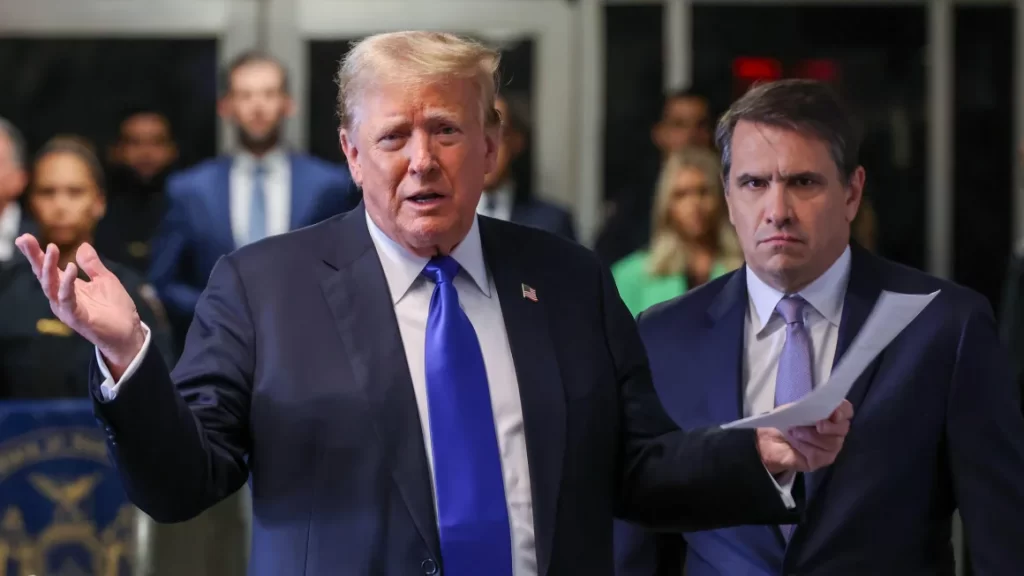President-elect Donald Trump is reportedly considering nominating his lead attorney, Todd Blanche, to serve as the deputy attorney general, the second-highest position at the Justice Department. Sources familiar with the discussions say that Blanche, who has represented Trump for the past 18 months, is being strongly considered for the role. If selected, Blanche would play a central role in managing the department, one of Trump’s top priorities, although no final decisions have been made yet.
Blanche has developed a close working relationship with Trump during his representation, particularly defending the president in his criminal hush money trial in Manhattan earlier this year. His frequent appearances with Trump in Palm Beach and on various trips have solidified his position as a trusted confidant within Trump’s inner circle. Given this proximity, many insiders have speculated that Blanche could follow Trump into a high-level position within the federal government if Trump won re-election.
A Familiar Face in Legal Circles
Blanche brings a wealth of legal experience to the table. Before representing Trump, he had a distinguished career as a federal prosecutor in the Southern District of New York. Afterward, he worked as a partner at a prominent white-collar defense firm. His experience in both prosecution and defense, coupled with his high-profile role in defending Trump, has made him a well-known figure in legal circles.
Despite his close ties to Trump, Blanche would still need to be confirmed by the Senate if nominated. While the confirmation process for top positions in the Justice Department can be contentious, Trump’s allies have noted that he is likely to prioritize loyalty in his cabinet appointments. This focus on loyalty is evident in his selection of Florida Rep. Matt Gaetz for attorney general, a move that is expected to face significant scrutiny even in the Republican-controlled Senate.
Trump’s first term saw a rocky relationship with his first attorney general, Jeff Sessions. Appointed to lead the Justice Department in 2017, Sessions quickly found himself at odds with Trump over the investigation into Russian interference in the 2016 election. Their fractured relationship ultimately led to Sessions’ resignation, and Trump relied on Deputy Attorney General Rod Rosenstein during much of his first term. Rosenstein, who appointed special counsel Robert Mueller, also faced a turbulent tenure and resigned in 2019.
Blanche’s Legal Experience and Recent Concerns
As a former federal prosecutor, Blanche has the legal expertise needed for a high-ranking position at the Justice Department. His time in the Southern District of New York, which is known for handling major criminal cases, gave him valuable experience in both prosecution and defense. This background, coupled with his leadership at a white-collar defense firm, has made him a respected figure in legal and political circles.
Blanche’s recent experience with cybersecurity threats has also drawn attention. The FBI notified him that his cellphone had been targeted by Chinese hackers as part of a broader operation aimed at high-profile politicians. Hackers were able to obtain some voice recordings and text messages from his phone, although none of the compromised information was related to Trump. This incident underscores the increasing cybersecurity risks faced by political figures, particularly those with significant influence in government.
Challenges Ahead
While Trump’s inner circle appears to be aligned in supporting Blanche’s potential nomination, the road to confirmation could be difficult. Although Trump’s choices for top positions in his second-term administration are expected to lean heavily on loyalty, Senate confirmation hearings often involve intense scrutiny, particularly for high-profile positions like deputy attorney general.
The Senate will likely question Blanche’s past legal work, his relationship with Trump, and his approach to leading the Justice Department. If confirmed, Blanche would be responsible for overseeing many of the department’s most critical functions, including its role in upholding the rule of law, managing investigations, and overseeing criminal justice reform efforts.
The Senate, particularly its Judiciary Committee, is expected to carefully vet Blanche’s record, especially given the high-profile nature of the Justice Department’s work and the growing political tensions surrounding Trump’s administration. The challenges faced by other recent appointees, such as Jeff Sessions and Rod Rosenstein, demonstrate the complexities of holding such a pivotal position, especially in a highly partisan political environment.
The Bigger Picture
Blanche’s potential nomination highlights Trump’s ongoing effort to surround himself with loyalists who share his vision for the Justice Department and other key areas of government. While this strategy has often led to controversy, it also reflects Trump’s desire to shape his second-term administration with individuals he trusts deeply.
As the nomination process unfolds, the focus will likely turn to how Blanche’s experience and relationship with Trump are viewed by the Senate and whether he can secure the necessary support to assume such an influential role. If confirmed, Blanche would be responsible for guiding the Justice Department through a complex and often contentious political landscape, overseeing major legal decisions that could have significant consequences for Trump’s policies and legacy.







